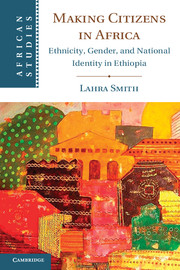Book contents
- Frontmatter
- Contents
- Maps and Tables
- Acknowledgments
- Abbreviations
- Glossary
- Maps
- Introduction
- The Challenge
- The Response
- 3 Popular Responses to Unequal Citizenship
- 4 A Referendum on Ethnic Identity and the Claims of Citizenship
- 5 No Going Back on Self-Determination for the Oromo
- 6 Ethiopian Women and Citizenship Rights Deferred
- Conclusion
- Appendix I Methodology
- Appendix II Questionnaire for Parents and Community Members (English)
- Appendix III Questionnaire for School Directors
- Appendix IV Questionnaire for Teachers
- Bibliography
- Index
6 - Ethiopian Women and Citizenship Rights Deferred
Published online by Cambridge University Press: 05 May 2013
- Frontmatter
- Contents
- Maps and Tables
- Acknowledgments
- Abbreviations
- Glossary
- Maps
- Introduction
- The Challenge
- The Response
- 3 Popular Responses to Unequal Citizenship
- 4 A Referendum on Ethnic Identity and the Claims of Citizenship
- 5 No Going Back on Self-Determination for the Oromo
- 6 Ethiopian Women and Citizenship Rights Deferred
- Conclusion
- Appendix I Methodology
- Appendix II Questionnaire for Parents and Community Members (English)
- Appendix III Questionnaire for School Directors
- Appendix IV Questionnaire for Teachers
- Bibliography
- Index
Summary
While ethnic groups have pursued equal citizenship in the contemporary Ethiopian polity, Ethiopian women and their allies have been similarly active in advancing gender equality and meaningful citizenship for women in Ethiopia. The intersectional nature of ethnic and gendered inequalities in Ethiopia and the unique constitutional provisions related to both identity groupings provide critical insights into the ways that expanding citizenship can provide new opportunities and new challenges. As diverse and divided societies confront legacies of inequality and exclusion based on race, ethnicity, and national origin, rights for these communities at times have been resisted based on how they might disproportionately harm female members of the community. How are such competing rights claims to be resolved? Are these rights even “competing” at all? And in, particular, are women uniquely harmed by the protection of the rights of ethnocultural groups within the state?
This is particularly important in places where a history of social inequality is deep-rooted and where this inequality is somewhat equally distributed between women as a group and ethnic and racial communities as a group. It is also important because scholars have argued that African feminisms tend to be “corporate,” viewing individuals as members of interdependent human relations, including family and community, rather than individualist, as in the west.
- Type
- Chapter
- Information
- Making Citizens in AfricaEthnicity, Gender, and National Identity in Ethiopia, pp. 169 - 191Publisher: Cambridge University PressPrint publication year: 2013



